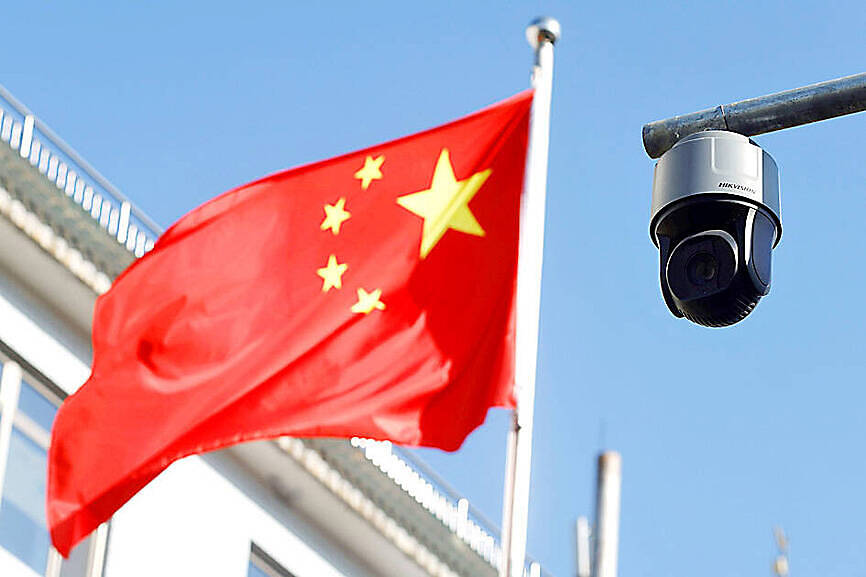New hotlines to help people evaluate possible safety risks before they travel to China, Hong Kong or Macau have been launched, the Mainland Affairs Council said in a statement on Monday.
The hotlines were launched amid a rise in inquiries from Taiwanese planning to travel to China, the council said.
The number of people who used its “Online Registration System for Taiwanese Citizens Visiting Mainland China” this year through Oct. 31 had increased 14-fold from the same period last year, it said.

Photo: Reuters
Registrations for people traveling to Hong Kong and Macau had increased five-fold from the same period last year, it added.
Taiwanese traveling to China do not have to inform the government, but for safety reasons, there is a system that allows it, the council said.
To assist people to use the new online registration system, or to evaluate potential safety risks of their travel plans, the council and the Straits Exchange Foundation jointly launched the hotline services, which are available on weekdays from 9am to 5pm, it said.
People planning to travel to China can use the Mainland Affairs Council’s hotline at (02) 2397-5589 (ex 5011) or the Straits Exchange Foundation’s hotline at (02) 2175-7000 (ex 7033), while people traveling to Hong Kong or Macau can contact the council at (02) 2397-5589 (ex 6015), the statement said.
The services were launched after Beijing amended and enacted national security laws in the past few years, and on June 21 issued a new set of guidelines targeting advocates of Taiwanese independence.
There have also been multiple cases of Taiwanese being “illegally detained, held and interrogated” in China, the council said.
The council on June 27 raised its travel alert for China, Hong Kong and Macau to the second-highest “orange” level, urging people to avoid unnecessary travel there due to increasing safety concerns, it added.

‘DENIAL DEFENSE’: The US would increase its military presence with uncrewed ships, and submarines, while boosting defense in the Indo-Pacific, a Pete Hegseth memo said The US is reorienting its military strategy to focus primarily on deterring a potential Chinese invasion of Taiwan, a memo signed by US Secretary of Defense Pete Hegseth showed. The memo also called on Taiwan to increase its defense spending. The document, known as the “Interim National Defense Strategic Guidance,” was distributed this month and detailed the national defense plans of US President Donald Trump’s administration, an article in the Washington Post said on Saturday. It outlines how the US can prepare for a potential war with China and defend itself from threats in the “near abroad,” including Greenland and the Panama

The High Prosecutors’ Office yesterday withdrew an appeal against the acquittal of a former bank manager 22 years after his death, marking Taiwan’s first instance of prosecutors rendering posthumous justice to a wrongfully convicted defendant. Chu Ching-en (諸慶恩) — formerly a manager at the Taipei branch of BNP Paribas — was in 1999 accused by Weng Mao-chung (翁茂鍾), then-president of Chia Her Industrial Co, of forging a request for a fixed deposit of US$10 million by I-Hwa Industrial Co, a subsidiary of Chia Her, which was used as collateral. Chu was ruled not guilty in the first trial, but was found guilty

A wild live dugong was found in Taiwan for the first time in 88 years, after it was accidentally caught by a fisher’s net on Tuesday in Yilan County’s Fenniaolin (粉鳥林). This is the first sighting of the species in Taiwan since 1937, having already been considered “extinct” in the country and considered as “vulnerable” by the International Union for Conservation of Nature. A fisher surnamed Chen (陳) went to Fenniaolin to collect the fish in his netting, but instead caught a 3m long, 500kg dugong. The fisher released the animal back into the wild, not realizing it was an endangered species at

DEADLOCK: As the commission is unable to forum a quorum to review license renewal applications, the channel operators are not at fault and can air past their license date The National Communications Commission (NCC) yesterday said that the Public Television Service (PTS) and 36 other television and radio broadcasters could continue airing, despite the commission’s inability to meet a quorum to review their license renewal applications. The licenses of PTS and the other channels are set to expire between this month and June. The National Communications Commission Organization Act (國家通訊傳播委員會組織法) stipulates that the commission must meet the mandated quorum of four to hold a valid meeting. The seven-member commission currently has only three commissioners. “We have informed the channel operators of the progress we have made in reviewing their license renewal applications, and